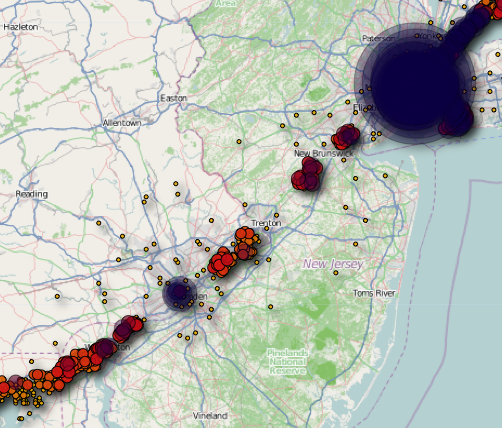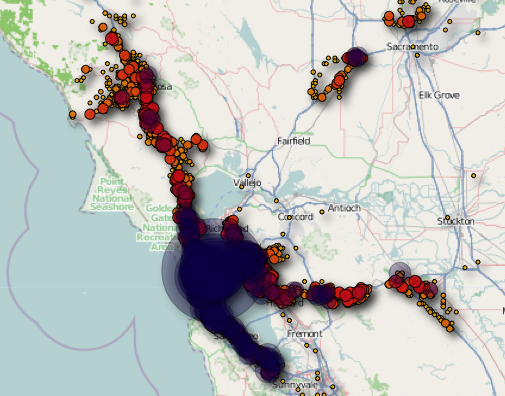Archive
Why Google+ Hangout Is Good for Long Distance Relationships
Let me preface this with the admission that I haven’t used Google+ nor am I a tech blogger. I’m just a guy whose fiancée happens to be on the other side of the continent. And I think “Hangouts” are brilliant.
I think this “Hangouts” feature of Google+ is brilliant in that it addresses one very core problem with video telephony: the expectation of interaction. While you’re on the phone, you can be doing plenty of other things. While you’re on video chat, in a way, you’re on stage. You feel like your full attention should be given to the chat at hand. Which is a real bummer if all you want to do is…well…hang out with the other person.
My fiancée is beautiful. I love to look at her. But I’m in Washington and she’s 3000+ miles away. Thanks to video chat seeing her is no longer such a barrier. The problem is that we always feel like video chat forces us into having a “conversation”. What if all we want to do is enjoy each others’ company? I can still look at her when we’re not talking, but after some time “looking” turns to “leering.” And no one wants to creep out the woman they’re about to marry!
So we came up with a solution: We watch TV shows on our laptops together. (Everyone facing a long distance relationship – here’s a big tip for you.) We make sure we’re on the same site (Hulu or Netflix) or buy from the same online store (iTunes or Amazon) and then we sync up our strikes of our respective play buttons. And there we are, in each others’ company, just watching TV. To “hang out.”
Hangout isn’t new technology, it’s just a new framework for existing technology. And that can be just as revolutionary. Kudos to Google.
My Iphone Life
Inspired by Alexis Madrigal, I took a few snapshots of my life with the iPhone.
This is our nation, seen through the filter of my movements over the last couple of years.

Really the most interesting area in my iPhone history is the East Coast. The lines you’re seeing there are largely train lines. Amtrak from DC to NY to Boston. And that little hook up and to the left is my favorite train ride in the country: the Adirondack to upstate New York is actually to the same destination, but on the highway.

It’s interesting to see the incorrect pings. I’ve never really been anywhere in New Jersey that the Amtrak doesn’t run through – yet you see those pings scattered across the countryside like a drunken ramble.

Last summer’s trip to Nova Scotia had the same thing: pings all over PEI. But I love too the personal stories. Here’s San Francisco, where I live. And that persistent cluster traveling up and to the left is to wine country, where I’m getting married.

Civilization V: When AIs rule the world
Civilization V is coming!

For those of you out there who don’t play a lot of videogames, don’t worry, I don’t either. In fact, you can tell it by the fact that the review I’m about to cite comes not from the explosive panoply of video game blogs out there, but from the WSJ’s Speakeasy blog:
[Question:] My 12-year-old son is among those who almost always turned to warfare as the way forward in Civ IV. How have you tweaked the AI to punish those who rely too heavily on one development strategy?
More than just a tweak, we have dedicated an entire software subsystem to scrutinizing the actions of the other players in the game. This “diplomatic AI” makes sure that each AI civilization performs a full assessment of each of its neighbors. Each turn this analysis includes noticing which players are trying to grab open land, which ones have particularly large armies, and also making a guess about which type of victory each opponent is pursuing. So your son’s warmongering will be noticed by the AI right away. This information is then critical to how the AI chooses its friends and enemies and also to how it picks its own path to victory.
They just keep making it harder! The article talks a bit about changes to the war-fighting mechanics – but the interview is with the game’s AI Programming Lead – so AI is a primary focus. And it’s fascinating!
Reading this I couldn’t help but imagine a future in which Civilization 10 actually just runs the same AI engines behind the foreign policy of small nations. That that was Firaxis’ twenty year corporate plan: building the diplomatic advisory algorithms for developing nations. (“Yes General, I’m sure your half-brother has a natural talent for diplomacy, but you might want to consider our product as a back-up.”)
From there it’s just another few iterative steps to the backrooms of power in the developed world.
And then?
I love the idea that sports provide an outlet for regional rivalries played out without bloodshed (British hooligans aside) – perhaps diplomatic games will provide the same. We’ll cheer on our national foreign policy AIs at the Global Civilization Olympics. All that friction of competing ideologies dissipating in the cheering throngs while the computers quietly negotiate the climate change treaties and free trade agreements.
